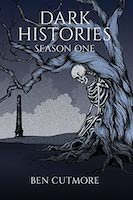Review: Something Wicked This Way Comes
/5 stars. Wow. This one moved me to tears. It's so strange... I didn't even really enjoy most of this reading experience. I stopped halfway through to read two other books, because I was bored and confused and needed a break from the purple prose. But somewhere in the second half, I got hooked - or maybe things clicked - and boom, suddenly I was crying. The ending hit me right in the fucking heart, or the gut, or the feels, or something. I just really wasn't expecting that.
Something Wicked This Way Comes should attract readers of all ages and preferences. I feel like my eyes have been opened... I see its influence everywhere from Stephen King to Erin Morgenstern to Clive Barker to Neil Gaiman to Cornelia Funke. It's about the arrival of a carnival at Green Town, Illinois, and how two young boys' discover something dark and sinister under the bright lights and the colorful canopies. It's also about being young and being old and corruption and friendship and fathers and sons and determination and heroism and laughter and free will and... temptation.
It's incredibly beautiful. I don't think I've encountered such gorgeous and unexpected prose since I read Lolita. The imagery is as haunting as it is whimsical and lush. It took some getting used to, but I'll miss those words floating around in my head painting vivid songs. I have associative synesthesia, and this writing might be the closest thing I could find that captures the way my brain concepts concepts and sounds and feelings with certain colors. The words have shapes and edges and corners. Reading this was like dancing inside of an orchestra made of many colors during a thunderstorm.
Originally published in 1962, this book does feature some out-of-date allegories, references and metaphors. And there's a thinly veiled thread of nostalgia running in between the lines, suggesting support for the imagined idea that America was a perfect dreamscape utopia in the 1950s (spoiler alert: it wasn't that). I've also read some fascinating reviews about how this book doesn't hold up at all, especially from an adult perspective. But that's partly why it made me so emotional, I think: like Stephen King's It, it strikes me as a story about the tragedy that is growing up, and I appreciate books that double down on that theme and then give it a solid kick in the teeth for fun.
I would've liked to have read this in college, for a class. I would've liked to have read this at age 13, when the battle between good and evil would've seemed brilliantly intense, and important. But here we are, age 30, disillusioned and cynical and skeptical and yet- and yet- or maybe because all of that- moved to tears by the written sound of laughter and Charles' parting thought that running with the boys, even if it killed him, would be worth it. Ohmygod I'm crying again. Thrilling, this one.
Something Wicked This Way Comes on: Amazon | Bookshop.org | Goodreads










